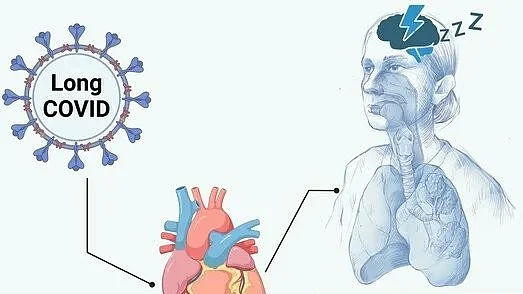Covid-19 may age blood vessels by 5 years, especially in women
‘Long Covid’ in general also affects females more, it has been found, and they have a worse impact from the cardiovascular side effects too

According to a recent study, contracting Covid-19 may accelerate the ageing of an individual's blood vessels by around five years, with women being particularly affected. The impact was more pronounced among women suffering from ongoing symptoms following Covid-19 recovery — commonly referred to as ‘long Covid’ — including shortness of breath and fatigue.
"Since the pandemic, we have learned that many people who have had (Covid-19) are left with symptoms that can last for months or even years. However, we are still learning what's happening in the body to create these symptoms," said lead researcher Rosa Maria Bruno from Université Paris Cité, France.
The research, published in the European Heart Journal, examined about 2,400 participants — roughly half of whom were female — across 16 countries, such as Australia, Brazil and several European nations.
Although blood vessels generally stiffen as people age, the study found that Covid-19 can speed up this process, increasing the chances of developing cardiovascular issues like stroke and heart attack, according to the researchers.
To assess vascular (blood vessel) age, the team used a device to measure how quickly blood pressure waves travel between the carotid artery (neck) and femoral arteries (legs), a process called 'carotid–femoral pulse wave velocity.' Higher pulse wave velocity indicates greater stiffness and ageing. Measurements were performed six months post-infection and repeated after a year.
The researchers noted, "An increase in pulse wave velocity of around 0.5 metres per second is clinically relevant and roughly amounts to ageing by five years, with a three per cent increased risk of cardiovascular disease, in a 60-year-old woman."
"(Pulse wave velocity) differences were significant in women, but not in men. Among Covid-19 positive women, persistent symptoms were associated with higher (pulse wave velocity)," the authors wrote.
Their findings showed that average pulse wave velocity rose by 0.55 metres per second in women with mild cases, 0.60 metres per second in hospitalised women, and more than 1 metre per second in women who required intensive care.
Explaining why Covid-19 affects blood vessels, Bruno said that the virus “acts on specific receptors in the body, called the angiotensin-converting enzyme 2 receptors, that are present on the lining of the blood vessels”.
“The virus uses these receptors to enter and infect cells. This may result in vascular dysfunction and accelerated vascular ageing. Our body's inflammation and immune responses, which defend against infections, may also be involved,” the lead researcher said.
Bruno also noted that females generally exhibit a more rapid and intense immune response compared to males, which can offer protection — but may also harm blood vessels following infection.
An accompanying editorial by Harvard Medical School researchers in the European Heart Journal stated, “Although the acute threat of the Covid-19 (coronavirus disease 2019) pandemic has waned, a new challenge emerged in its aftermath: post-acute Covid-19 syndrome.”
The editorial also stressed, “COVID-19's vascular legacy is real, measurable, and with a plausible likelihood of sex-specific findings.”
“Covid-19 has aged our arteries, especially for female adults. The question is whether we can find modifiable targets to prevent this in future surges of infection, and mitigate adverse outcomes in those afflicted with COVID-19-induced vascular ageing,” the authors said.
“A stable or improved (pulse wave velocity) after 12 months was found in Covid-positive groups, whereas a progression was observed in the Covid-negative group,” they also found, oddly enough.
Follow us on: Facebook, Twitter, Google News, Instagram
Join our official telegram channel (@nationalherald) and stay updated with the latest headlines
